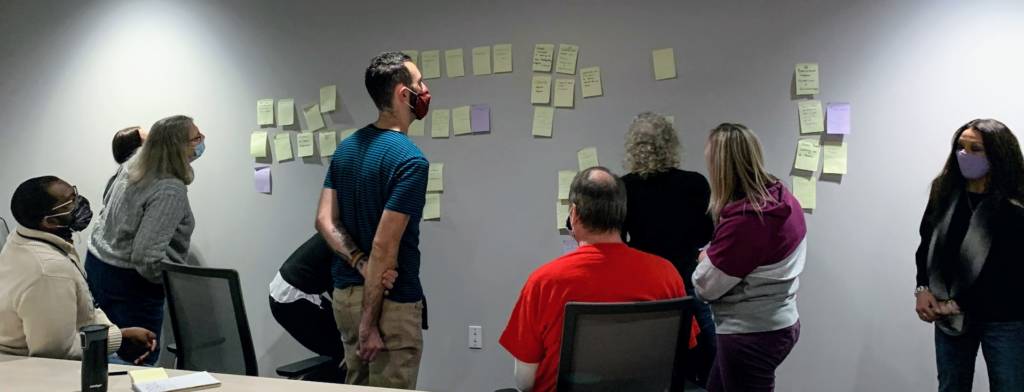There is poor communication in this organization!
The communication problem is super common – and it is often puzzling. You’ve probably said the same thing or read employee feedback about how communication is inconsistent or unclear, or people feel like you are hiding something or out of the loop. Then managers often state, “We overshare with people, and they don’t keep each other informed; this makes it hard to do a good job.”
You’ve most likely tried multiple attempts to fix or improve communication challenges, and it may have gotten better for a short time – then fell back to the way things were.

“We notice a common and immediate response to such complaints. Managers start calling for more sophisticated distributed information systems and procedures for storing and accessing information so they can retrieve it efficiently. They call for better briefings and fuller circulation of meeting reports.
However, why has no company we know of managed to install such systems and procedures that remove the complaints? No matter how sophisticated the new information systems and procedures are, the complaints continue.
“Our biggest problem is poor communication.”
Why do managers not discuss that the complaints remain the same no matter how the information systems are developed?
What if there is no alternative to a situation where information is all over the place and where meaning can only be made by many different people making sense together in many different groupings and conversations? What if this is the most effective way to develop knowledge when the future is so unpredictable?”
Complexity and Management. Ralph D. Stacey
The statement above may feel weird and a little confusing.
What if the way communication is happening is how it happens, and this confusion is what’s best for the work?!
AND when you keep doing more of the same – trying to improve communication – the same results keep happening, just with more frustration and more channels for communication that create more confusion.
What is the challenge with communication within work?
- The belief that communication within a company is any different from communication outside a company’s confines. Whenever you gather people together, they will hear, retain, share, interpret, and remember what they want. Humans, even with technology, cannot keep a meaning or feeling consistent as we communicate multiple times. *have you ever played the telephone game?
- When communication happens (verbally or written), you have an intention behind it, and when someone else hears or reads it, they have their intention and understanding. We are great at sense-making and can often place meaning that isn’t there into communications. *have you ever gotten an email or text and thought that the other person was mad? Only to find out they just wanted to talk?
- Managers try to force order and harmony on work systems. Often systems-thinking wants organizations to have harmony or the systemic wholes to be in equilibrium. AND this push towards balance moves disagreement or points of apparent contention into the informal networks or makes it undiscussable – i.e., we are communicating, and this is a constant OKR, BUT nothing ever changes?
- While working with a University, in a Senate meeting, one of the professors said, “We have a communication problem here!” Another professor said, “We don’t have communication problems. When something bad happens, it spreads quickly and wide.”
- To improve communication, organizations invite more people to share how to improve things or be a part of the communication. However, the more people we invite, the more watered-down the communication becomes. The not invited people will feel even more like outsiders and notice that they are out of the communication loops.
What can you do about communication challenges within your company or team?
- Accept that messages will be messy and complex, plus that people will hear stuff, reimagine what was said, and forget things.
- While sharing through the formal structures (meetings, emails, chats, newsletters), don’t try to overpolish the message. Keeping some messiness will encourage challenges and coherent discussions.
- Change happens with multiple people interacting and while doing their work trying to understand how we do things while doing the work they have to do. Your communication is not as important to them, and what is important is how they interact with others to make sense of what is happening and how to do the work or respond at that moment.
- Find ways to spread messages through informal networks. Some ways to do this is by mixing people in workgroups to share experiences of what does and does not help them get their work done. Another way is sharing information and data (without expert interpretation) to the whole organization or team; Listening and accepting what you hear as a point of information, AND not trying to fix or change anything.
- Empathy and enhanced communication come from finding shared experiences while having different lives. You cannot manufacture or design empathy. Within your organization and team, many people have similar shared experiences. Find ways to let conversations about these shared experiences happen and don’t force some process or procedure on top of the communication.
- Turn the focus to how people interact. Interactions are the driver of ethics and perceived communication within complex-adaptive systems. Make opportunities for interactions and encourage all to strengthen those interactions’ depth and breadth.
Communication within organizations will always be challenging. As your team and company grow in size, the ability to share a message increases exponentially. No technology, methodology, or tool will allow you to tinker like an engineer or observe the wholes like a scientist (separated from the environment) and change conditions to create harmony.
Communication is interpersonal, changes when interactions change, and room for discourse and disagreement are clear valuable attractors for innovation and progress.

